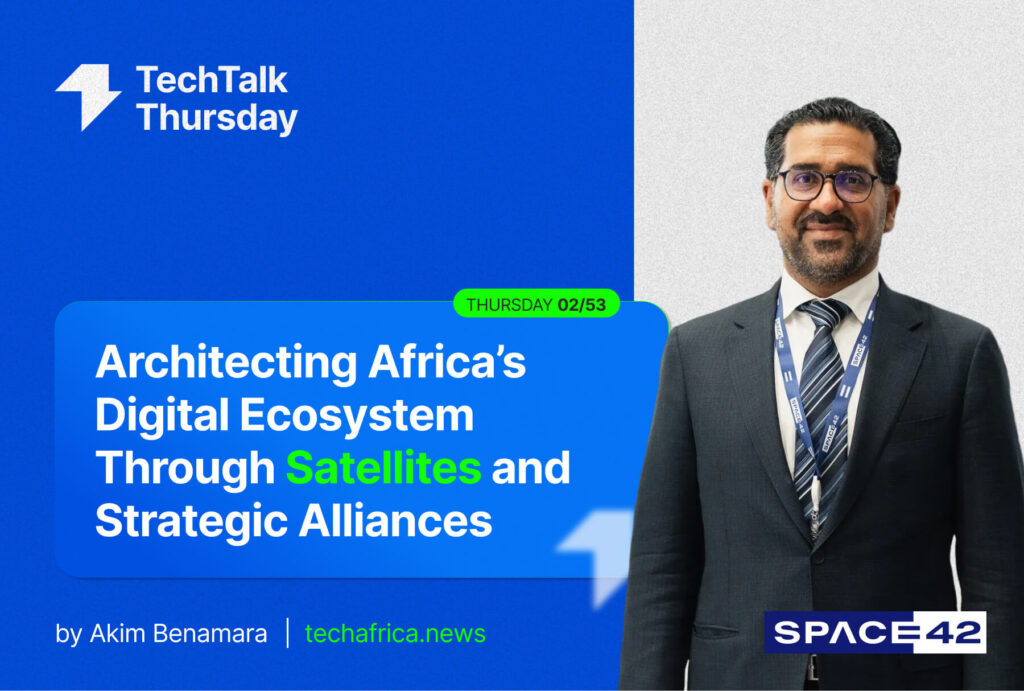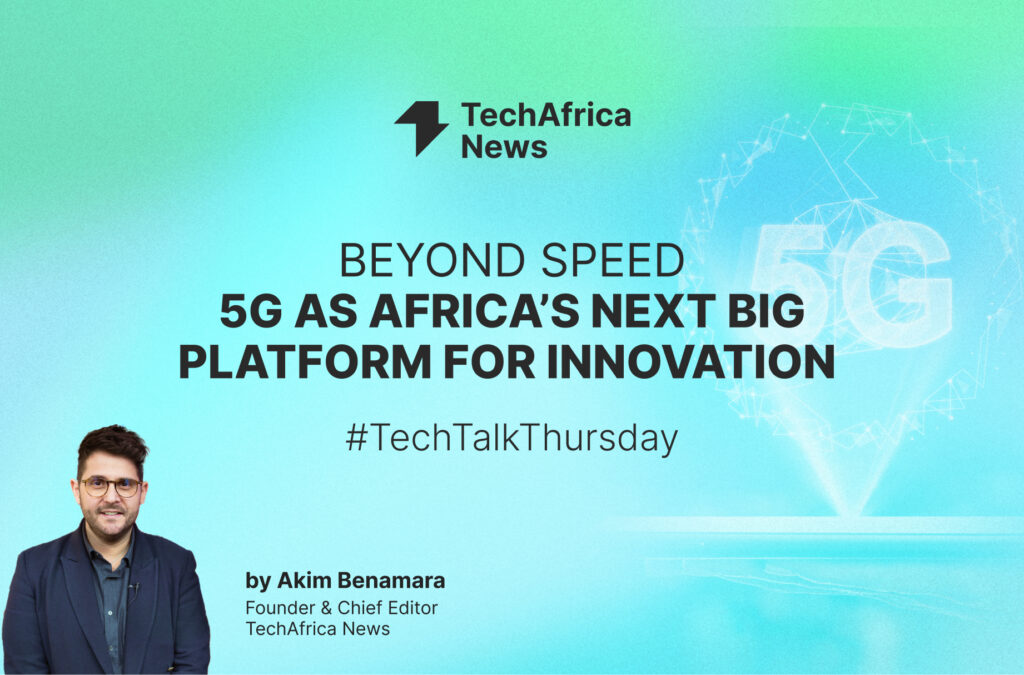MWC Kigali 2025 Post-Show Report: When the Industry Converges, The Future is Built
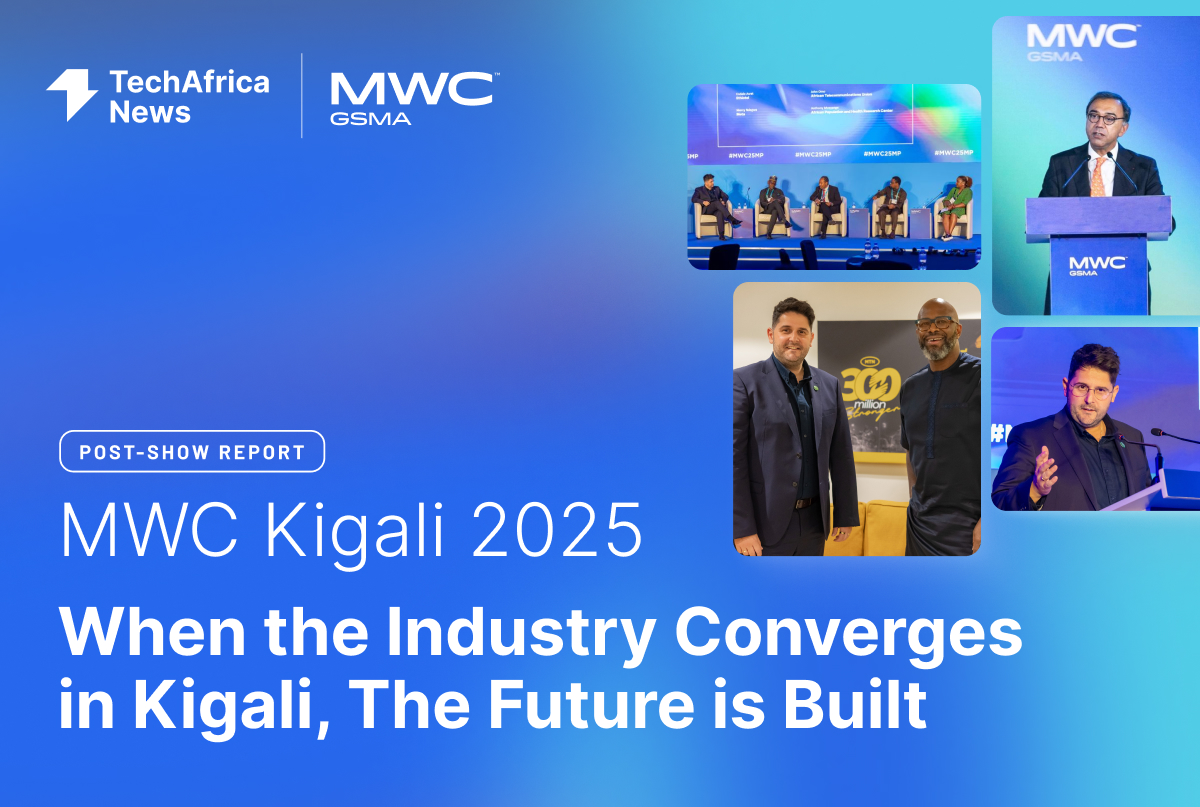
MWC Kigali 2025, held from 21 to 23 October, delivered an outstanding showcase of innovation, collaboration, and forward momentum for global and African technology. Under the theme Converge. Connect. Create., the event carried an energy that was impossible to miss. Every hall, panel, and exhibition space reflected a continent and an industry ready for its next chapter.
This year stood out in a special way for Africa. Senior policymakers, industry leaders, and development partners came together with a shared ambition to push digital transformation further and faster. The tone was confident, purposeful, and united around creating real impact across communities, businesses, and entire economies.
From connectivity breakthroughs to fintech, AI, cloud, satellite innovation, and emerging technologies, the three days revealed a clear picture of where Africa is heading. The show did not fall short. It delivered a strong reminder that the continent is stepping into a new era of digital growth with confidence and clarity.
As the official media partner for the event, TechAfrica News can summarise the entire show in one word: successful.
“MWC Kigali continues to show that Africa is shaping its own digital destiny. Every conversation, every announcement, and every partnership revealed a continent that is moving with purpose. The energy this year was remarkable. There is a clear sense that Africa is not only participating in the global digital economy but is defining key parts of its future. This is the momentum that will carry the continent into its next phase of growth.”
– Akim Benamara, Chief Editor and Founder, TechAfrica News
Here is a recap of three impactful days that shaped conversations and set the tone for what comes next.
In This Report
First, Here Is What Participation Looked Like

The quality of an event, especially one of this scale, goes far beyond the numbers. It is measured by the calibre of people it brings together, the conversations it sparks, and the impact it creates. MWC Kigali 2025 delivered strongly on both fronts. The turnout, the representation, and the depth of engagement reflected an industry that is moving forward with confidence.
The event brought together an impressive mix of global and African leaders across technology, policy, and development. High-level government representation included H.E. President Paul Kagame, underscoring Rwanda’s strategic commitment to digital transformation, alongside Hon. Paula Ingabire, Rwanda’s Minister of ICT and Innovation, and Esther Kunda, Director General of Innovation and Emerging Technologies at the Ministry of ICT and Innovation. Their presence highlighted the central role of policy leadership in driving Africa’s digital future.
Over the three days, nearly 80 exhibitors, sponsors and partners were present on the show floor, contributing to a vibrant and engaging environment. More than 230 speakers and panellists took part in keynotes, conferences and summits, offering insights that shaped discussions about the future of connectivity, innovation and digital ecosystems.
Major African and global players, including Airtel, Axian Telecom, Ericsson, Ethio Telecom, Huawei, Meta, MTN, Orange, Qualcomm, Safaricom, Vodacom and ZTE, were strongly represented. Their involvement added weight to the conversations and demonstrated the high level of commitment to advancing digital transformation across the continent.
This year also marked the first time the GSMA Ministerial Programme joined MWC Kigali. It convened 49 delegations from 33 countries and 16 intergovernmental organisations, reinforcing the importance of policy collaboration in shaping Africa’s digital future. In addition, the FEWA one day summit was co-located with MWC Kigali for the first time, uniting AI pioneers, policymakers and innovators focused on accelerating AI-driven solutions for education and workforce transformation in Africa.
More than 100 media and industry analysts from global markets attended the event, further highlighting the international interest in Africa’s digital progress. Overall, participation this year reflected a strong and unified commitment to strengthening collaboration and driving the next phase of Africa’s digital transformation.
Headlines Everyone Was Talking About
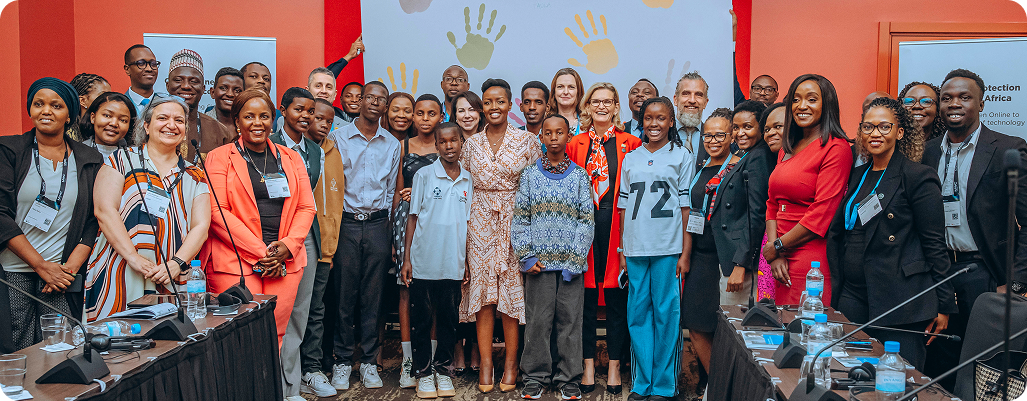
MWC Kigali 2025 was packed with announcements that didn’t just make headlines; they signalled real momentum for Africa’s digital future. Among the standouts was the launch of Africa’s first Taskforce on Child Online Protection, a multi‑stakeholder platform jointly created by UNICEF and GSMA. This initiative reflects a growing recognition that as more African children go online, their safety must be a core part of the digital governance conversation. The Africa Taskforce on Child Online Protection will bring together partners from the mobile industry, technology sector, regulatory bodies, law enforcement, and civil society. Etleva Kadilli, Regional Director for Eastern and Southern Africa at UNICEF, said, “As Africa’s children step boldly into the digital world, their safety must come first. By uniting governments, partners, and young people, we can make safety the foundation of Africa’s digital future.”
“The Taskforce marks an important step from strategy to action, turning the whitepaper’s recommendations into tangible regional progress. By working alongside UNICEF, governments, industry, and youth representatives, we aim to embed safety into Africa’s digital transformation journey and ensure children’s voices shape the policies that define their future. Together, we will strengthen digital governance, promote safety by design, and ensure that children and young people’s voices shape the policies that define Africa’s digital future. By working in partnership, we can position Africa as a global leader in child-centred digital governance.”
– Caroline Mbugua, Director of Public Policy, GSMA Africa

On the frontier of artificial intelligence, GSMA led a coalition of major African operators and tech organizations—including Airtel, MTN, Orange, Vodacom, Axian Telecom, Ethio Telecom, Masakhane African Languages Hub, Lelapa AI, Pawa AI, Qhala, Cassava Technologies, the African Population for Health Research Center (APHRC), Awarri, and the World Sandbox Alliance—to build inclusive AI language models. The goal: create tools “by Africa, for Africa” that properly represent African languages, cultures, and knowledge in the world of AI. This initiative addresses the continent’s linguistic diversity in global technology development and focuses on closing gaps in data, compute, talent, and policy.
“Africa’s diversity of languages and cultures is one of our greatest strengths, yet it has too often been overlooked in the development of global AI systems. This initiative is about turning that challenge into an opportunity – building African-led AI capacity, empowering innovation across local industries, and ensuring Africa shapes the digital future on its own terms. By working together, we can make AI more inclusive, more relevant, and more reflective of the world we live in.”
– Angela Wamola, Head of Africa, GSMA
Affordability also made a strong showing. In a major push for digital inclusion, GSMA and six leading mobile operators (Airtel, Axian Telecom, Ethio Telecom, MTN, Orange, and Vodacom) proposed baseline specifications for entry-level 4G smartphones. These specifications, covering everything from memory and battery to camera and display – are meant to reduce cost without compromising usability. According to GSMA, a $30–$40 device could significantly expand access, helping millions more Africans connect to the internet.
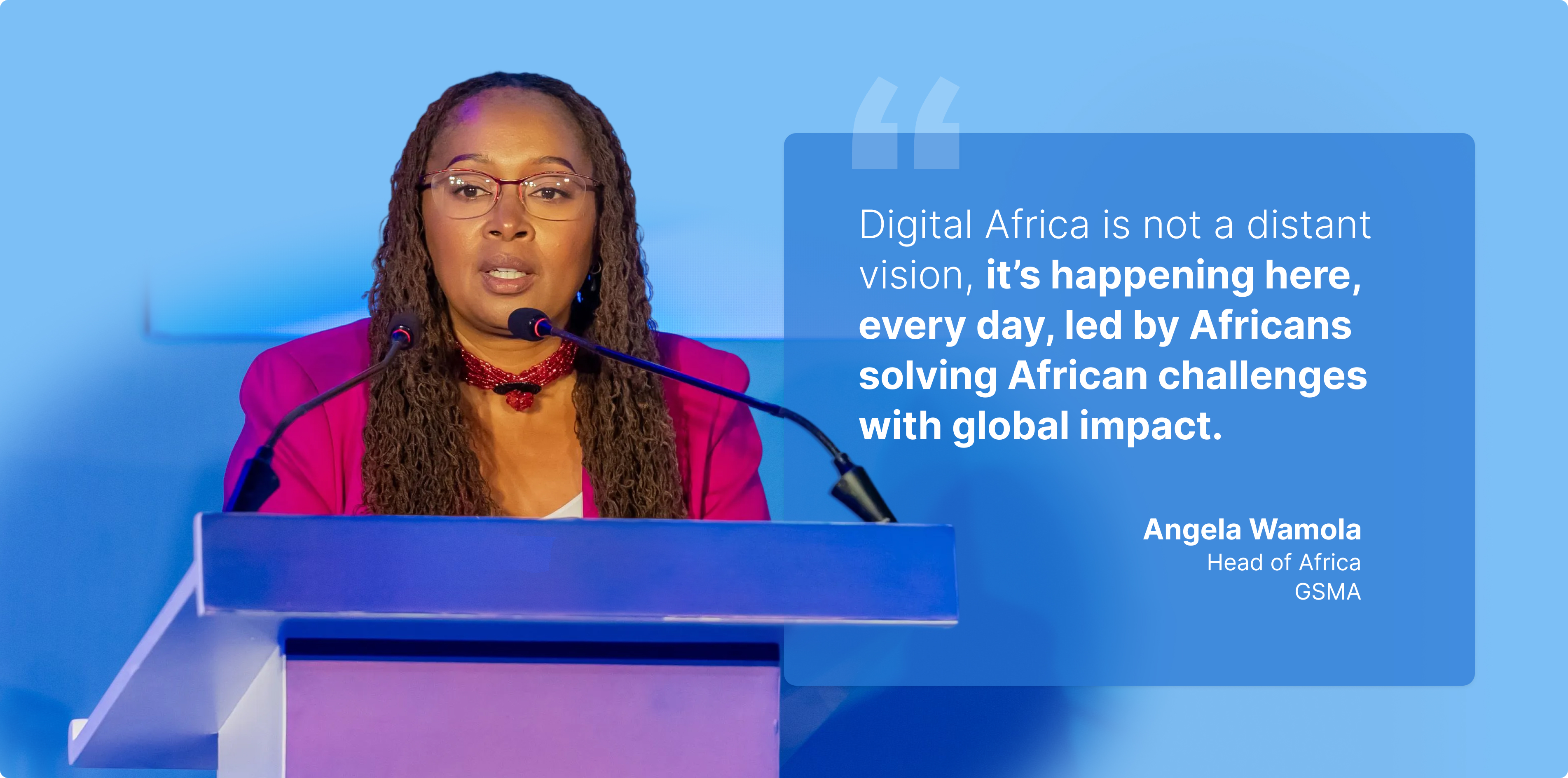
The GSMA Handset Affordability Coalition initiative is set to make entry-level 4G smartphones widely accessible, targeting millions of Africans currently excluded from the digital economy. By aligning operators, manufacturers, and policymakers around a shared vision, GSMA is driving tangible action to bridge the digital divide.
“By uniting around a shared vision for affordable 4G devices, Africa’s leading operators and the GSMA are sending a powerful signal to manufacturers and policymakers. This is an important step towards bridging the digital divide and ensuring that millions more people can reap the benefits of mobile connectivity.”
– Vivek Badrinath, Director General, GSMA
Taken together, these three announcements show a clear, coordinated effort across industry, government, and civil society to make Africa’s digital future safer, more inclusive, and more accessible. MWC Kigali wasn’t just about new tech — it was a meeting point for action.
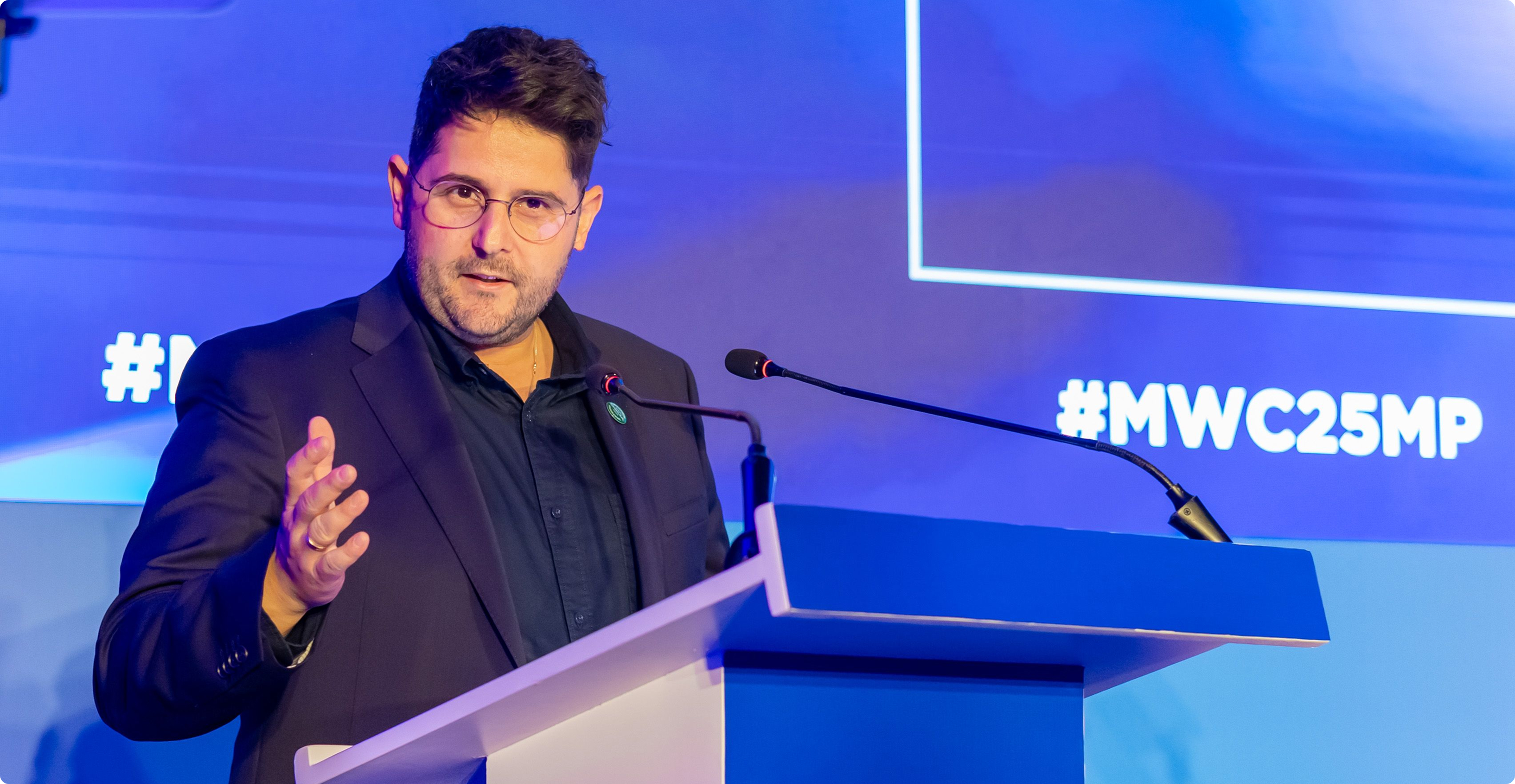
What TechAfrica News Did On-Site
Our work on-site at MWC Kigali 2025 reflected two complementary roles. We contributed to the broader policy conversation while also paying close attention to the voices shaping the future of digital connectivity across the continent.
As part of this, our Chief Editor and Founder, Akim Benamara, moderated the high-level Ministerial Programme panel “Connectivity Counts: Bridging the Digital Divide”. The session examined practical ways Africa can accelerate universal and meaningful connectivity by addressing gaps in coverage, affordability, digital skills, and enabling policy environments.
The discussion brought together a range of perspectives from regulation, industry, technology platforms, and research. Although we do not have the full session recording, the guiding questions used during the panel give a clear indication of the themes each speaker focused on.
John Omo, the Secretary General of the African Telecommunications Union (ATU), spoke about the importance of regional policy harmonisation and how coordinated spectrum planning and cross-border frameworks can reduce costs and improve service continuity. He also highlighted the role of financing instruments such as Universal Service Funds in supporting affordable devices and large-scale digital literacy programmes.
Anthony Mveyange, Director of Programmes at the African Population and Health Research Center, centred his contribution on evidence and measurable impact. He explained how indicators such as digital skills, smartphone penetration, and usage patterns are directly linked to productivity and inclusive economic growth. He also highlighted the role of research institutions and civil society in shaping equitable digital policies and pointed to promising financing models that support digital skills development among youth and small enterprises. Crucially, he underscored a point that resonated strongly throughout the session: Africa’s next phase of digital growth depends on moving from talk to action. He stressed that progress now requires deliberate execution, backed by data, partnerships, and programmes that produce tangible results for citizens.
Endale Asrat, Chief Information Officer at Ethio Telecom, emphasised the reforms that enable operators to lower the cost of devices and data while maintaining network security. He discussed how interoperable digital payment systems, e-government services, and education platforms can drive smartphone adoption by creating clear everyday value for users. He also pointed to spectrum and infrastructure policies that help deepen network coverage in underserved areas.
Mercy Ndegwa, Public Policy Director for East and Horn of Africa at Meta, focused on the need for trusted and safe digital ecosystems. She underscored how privacy, data protection, and cybersecurity frameworks build user confidence, especially among youth. She also stressed the importance of local content and digital literacy so that connectivity translates into real economic and social participation.
Together, the speakers reinforced a shared view of the work ahead: coordinated policy, inclusive innovation, and practical collaboration that ensures Africa continues to advance toward universal and meaningful connectivity.

In addition to moderating sessions, TechAfrica News captured a broad range of interviews with CEOs, VPs, ministers, and exhibitors, walked the exhibition floor, reported in real-time, and highlighted daily key takeaways from conversations across the show. . Here’s a quick look at who we spoke to and the insights they shared. For the full conversations, watch the complete video interviews and get the complete perspective straight from the leaders shaping Africa’s digital future.
Minister Paula Ingabire on Driving Inclusive, Homegrown Technology Solutions Across Africa
To start, for Rwanda, we are a proof-of-concept hub. So when you think about the approach that we’ve taken for technology, it is really simple. Do we see an opportunity for technology to respond to our needs? And the answer is always yes.
– Honorable Minister Paula Ingabire, Minister of ICT and Innovation, Rwanda
Bringing Every African Online: GSMA’s Angela Wamola on Driving Digital Inclusion from the Ground Up
“In 2017, the coverage gap; the portion of the population not covered by mobile broadband, was 35%. Today, it is 9%, showing remarkable progress in a very short time. But there is still a 9% gap, mostly in hard-to-reach areas, mountainous regions, or conflict-affected zones that still need coverage. This is where partnerships with satellites, solutions, and technologies become essential, because the ability to cover the broadest and most difficult terrains is necessary.”
– Angela Wamola, Head of Africa, GSMA
GSMA’s Caroline Mbugua on Closing Africa’s Connectivity Gaps and Protecting Children Online
“What we need now is the implementation of these policies because the majority of African countries already have a policy in place that provides guidance on child online protection.”
– Caroline Mbugua, HSc., Senior Director for Public Policy and Communications, GSMA
Empowering a Digital-First Africa: MTN’s Ralph Mupita on AI, 5G, and Investment Priorities
“I think the winds of change are blowing very strongly across the world from a regulatory perspective. The regulatory frameworks we have today were set up in a much more voice-centric world of communication. A data-centric world, which is far more capital-intensive, is very different. One of the areas we highlight is that nation-states need to be very thoughtful about developing national digital strategies.”
– Ralph Mupita, President and CEO, MTN Group
Infrastructure, Skills, Affordability: ATU’s John Omo Maps Out Africa’s Path to Digital Inclusion
“There must be a pipeline delivering the content to the end user. It is not enough to put a terminal in someone’s hands. We have seen cases where people had devices but used them for unrelated purposes because the content was not relevant to their needs. What matters is providing relevant content and ensuring the backhaul can deliver it at the right speeds, whether for health, education, or agriculture.”
– John Omo, Secretary General of the African Telecommunications Union (ATU)
Bridging Sectors and Building Futures: ITU’s Calls For Collaborative Regulations for Africa
“If there’s no partnership, there’s no sustainability. Because, as we see and hear at this Mobile World Congress, digital is enabling other sectors. If there’s no connectivity, there’s no AI. If there’s no AI, the economy of AI we’re talking about does not exist. If there’s no connectivity, there’s no digital economy. Partnership and collaboration are key”
– Dr. Emmanuel Manasseh, Regional Director for Africa, International Telecommunication Union (ITU)
Empowering Africa’s Youth: APHRC on Mentorship and Connectivity for Africa’s Next Generation
“Now, what we are seeing consistently across sub-Saharan Africa now is that the young people in urban areas are slowly migrating back to rural areas. And when they go there, they are transforming rural economies. They are introducing what we call a non-farm rural economy where these mobile money services are now being transferred into rural areas to help families to earn more. And on average, wage and incomes in the rural areas are actually increasing relative to urban areas in sub-Saharan Africa.”
– Antony Mveyange, Director of Programmes, African Population Health Research Centre (APHRC)
5G as a Platform for Innovation: Ericsson’s Vision for Africa’s Connected Future
“Well, there were a lot of takeaways, but I think first and foremost, there is the fantastic pace of development we have here in Africa. Now we have 5G coming online, we have further 4G penetration coming in as well. I think we estimate that by 2030, we will have 400 million 5G subscriptions in Africa. And it’s truly happening at scale now. But it’s also very much about the collaboration of how we make 5G as a platform, building economies.”
– Patrick Johansson, President and Head of Europe, Middle East, and Africa, Ericsson
Extending Africa’s 5G Reach: SES on Hybrid Satellite-Terrestrial Networks and Connectivity Impact
“If you think about connecting the unconnected and driving networks further into areas without connectivity today—whether through 2G, 3G, 4G, or 5G—we are capable of delivering applications and solutions to all of these. There are no limitations from a productization perspective.”
– Hans Geldenhuys, Director – Africa, SES
Connecting for a Better Future: Vodacom on Africa’s Voice in Global Digital Policy
“When I say all, I mean all—as in governments, regulators, policymakers, industries, telecommunication providers, partners. We all have the same goal, which is the betterment of the lives of Africans. If we all recognize that this is the goal we share, that’s when things start happening.”
– Ayman Essam, Chief External Affairs Officer, Vodacom Group
Leapfrogging to the Future: Axian Telecom’s Blueprint for a Connected, Tech-Driven Africa
“First, as a service provider, the private sector can support the public sector in digitally transforming their operations, improving efficiency, and better addressing citizens’ daily needs and transactions. Second, as corporate citizens, we must ensure that governments provide policies and facilities that create a secure environment for investment. Most importantly, this collaboration enables the acceleration of technology adoption across the countries where we operate.”
– Hassan Jaber, CEO, Axian Telecom
Ericsson on Harnessing 5G to Drive Scalable Connectivity, AI-Enabled Networks, and Local Innovation
“For us, one element that makes 5G an interesting and transformative technology for Africa is all the capabilities it offers. And it goes beyond the latency and the throughput. When you open the capabilities of the entire network to developers, you can really scale up innovation to a level that we can’t even now realize. From an Ericsson standpoint, network exposure is a big area we focus on, and we also aim to bring the entire ecosystem to support us in this effort.”
– Majda Lahlou-Kassi, Vice President and Head of Customer Unit West and Southern Africa, Ericsson
MTN’s Tobe Okigbo on Closing Africa’s Usage Gap and Advancing Sustainable Connectivity
“When people hear the word sustainability, the first thought often goes to climate change. Others interpret it through the broader ESG lens that includes environmental, social, and governance considerations. However, sustainability should extend beyond these categories”
– Tobe Okigbo, Chief Corporate Services and Sustainability Officer, MTN Nigeria
Editor’s Note: What We Took Away From the Show
After three days at MWC Kigali 2025, one thing is clear: Africa’s digital future has moved long away from just a conversation, it is in motion. Every announcement, from AI language models to entry-level 4G smartphone standards and child online protection initiatives, pointed to a common goal: a digital Africa that works for everyone.
The patterns and priorities emerging from the show are unmistakable. It was in the conversations we had, the questions asked, and the solutions proposed. There is a real sense of momentum; a growing alignment between policy, industry, and society, to tackle the continent’s connectivity gaps and digital inequities.
“MWC Kigali reinforced what we have long said at TechAfrica News: Africa is not waiting for the future, it is building it. What we saw here were ideas turning into action, commitments turning into partnerships, and a determination across sectors to leave no one behind in the digital transformation journey.”
– Akim Benamara, Chief Editor and Founder, TechAfrica News“MWC Kigali showed that technology alone is not enough. For Africa to truly benefit, we need solutions that are accessible, locally relevant, and empowering — for women, young people, and underserved communities across the continent.”
– Joyce Onyeagoro, Senior Editor, TechAfrica News
Looking at the track record of progress, the next digital year is definitely going to be one of further acceleration and tangible impact.
Stay connected with TechAfrica News for more insights, and we’ll see you next year at MWC Kigali 2026, 16–18 June 2026.




